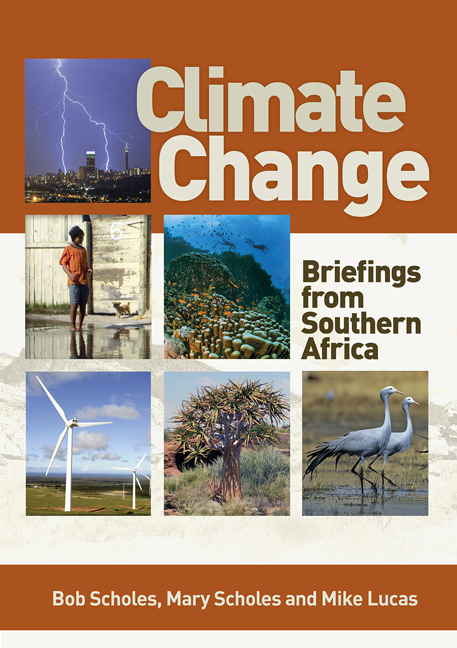Book contents
- Frontmatter
- Acknowledgements
- Contents
- Foreword
- Acronyms and abbreviations
- Preface
- How do governments assess climate change?
- Section 1 Earth system science: The processes that underlie climate change
- Section 2 Consequences of a changing climate for the Southern African environment
- Section 3 Consequences of a changing climate for society
- Introduction
- 1 Is the South African economy vulnerable to climate change?
- 2 How will climate change affect agriculture?
- 3 Will there be enough food to eat?
- 4 Do cow farts really cause global warming?
- 5 How will forestry in South Africa respond to climate change?
- 6 How will climate change affect South Africa's marine fisheries and aquaculture?
- 7 What are the human costs of climate change?
- 8 How do climate and air pollution interact to affect human health?
- 9 Will climate change cause malaria to spread in South Africa?
- 10 Should South Africans worry about rising sea levels?
- Section 4 What we can do to avoid and adapt to climate change
- Codicil Is there a dangerous level of climate change?
- Glossary
- List of figures
- References
- Reading list
- Index
2 - How will climate change affect agriculture?
from Section 3 - Consequences of a changing climate for society
Published online by Cambridge University Press: 20 April 2018
- Frontmatter
- Acknowledgements
- Contents
- Foreword
- Acronyms and abbreviations
- Preface
- How do governments assess climate change?
- Section 1 Earth system science: The processes that underlie climate change
- Section 2 Consequences of a changing climate for the Southern African environment
- Section 3 Consequences of a changing climate for society
- Introduction
- 1 Is the South African economy vulnerable to climate change?
- 2 How will climate change affect agriculture?
- 3 Will there be enough food to eat?
- 4 Do cow farts really cause global warming?
- 5 How will forestry in South Africa respond to climate change?
- 6 How will climate change affect South Africa's marine fisheries and aquaculture?
- 7 What are the human costs of climate change?
- 8 How do climate and air pollution interact to affect human health?
- 9 Will climate change cause malaria to spread in South Africa?
- 10 Should South Africans worry about rising sea levels?
- Section 4 What we can do to avoid and adapt to climate change
- Codicil Is there a dangerous level of climate change?
- Glossary
- List of figures
- References
- Reading list
- Index
Summary
Some forms of agriculture will benefit while others will be disadvantaged. On average, the effects of climate change for South African agriculture are negative but not catastrophic.
Higher temperatures, shifting seasons, more frequent and extreme weather events, flooding and drought will significantly challenge future agricultural food production in most parts of the world. In a dry country like South Africa, which averages just 450 mm rainfall a year, water is a critical issue. About 60–70% of the water resources of South Africa are currently used for agriculture.
Global warming and associated changes in rainfall patterns are beneficial to some forms of agriculture in some places, notably in areas currently too cool for optimum production, or where rainfall is projected to increase more than the projected increase in evaporation, so leaving the soils moister. Every crop and animal has a temperature optimum for growth and yield. For most, this lies in the range 25–30°C. In general, places that are already warmer than this during the growing season will experience lower production as the temperature rises further, whereas places cooler than optimal will benefit from warming. Mean global warming of up to about 2°C above the pre-industrial average is predicted to result, globally, in a rough balance between less and more productive regions, meaning that total global food production will remain approximately the same as it is now, all else being equal, even if there are large local changes. Above 3°C of warming, overall global agricultural production is projected to fall steeply.
The interior of Southern Africa is warming at about twice the rate of the global average, and is mostly already above the temperature optimum. Southern Africa therefore falls into the category of regions where agriculture will be negatively affected overall.
The agricultural Gross Domestic Product (GDP) in South Africa is more or less evenly spread between livestock, short-duration crops (principally cereals such as wheat and maize), and long-duration crops such as fruit orchards and vineyards. All are vulnerable to climate change, but in different ways. Livestock (cattle, sheep, goats, pigs and poultry) are warm-blooded creatures. They produce heat as a by-product of metabolism, but need to maintain a steady body temperature between 36 and 38°C. As the ambient temperature approaches this fixed body temperature, they must stay in the shade instead of feeding, which means that less energy is available for growth.
- Type
- Chapter
- Information
- Climate ChangeBriefings from Southern Africa, pp. 113 - 115Publisher: Wits University PressPrint publication year: 2015



